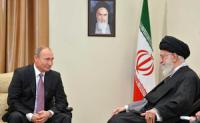-
Analysts: China trying to use Belt and Road meeting to counter U.S. influence
China is getting ready to welcome representatives from 150 nations, including senior leaders of 40 countries, to discuss its international infrastructure program at the second Belt and Road Forum, beginning Thursday and running through Saturday in Beijing. Analysts say it is not merely a conference on infrastructure building, but an attempt by China to display its popularity and power as a political rallying force.
-
-
Lasting U.S. preeminence: A review of Michael Beckley’s “Unrivaled”

The Economist last year proclaimed that the “Chinese century is well under way,” and that China is on its way to replacing the United States as the new global “hegemon.” Tufts University’s Michael Beckley says: Not so fast. He argues not only that U.S. preeminence is safer than most contemporary commentary would have one believe, but also that it is more resilient: “Unipolarity is not guaranteed to endure,” he concludes, “but present trends strongly suggest that it will last for many decades.”
-
-
U.S. allows lawsuits against foreign companies using property seized by Cuba

The U.S. will allow U.S. citizens to sue foreign companies and individuals who use property confiscated from them decades ago by the government of then-Cuban leader Fidel Castro. The decision likely will hinder Cuba’s efforts to encourage foreign investment to the island.
-
-
New air link evidence of Iran's growing influence in Venezuela

This month’s re-opening of an air link between Tehran and Caracas as the latest evidence of Iran’s growing role alongside Russia and Cuba in bolstering the multilayered security apparatus keeping Venezuelan President Nicolas Maduro in power.
-
-
On rogues and peers: Russian, Chinese challenges to U.S. national security
Russia and China represent distinct challenges to U.S. national security. Russia is not a peer or near-peer competitor but rather a well-armed rogue state that seeks to subvert an international order it can never hope to dominate. In contrast, China is a peer competitor that wants to shape an international order that it can aspire to dominate.
-
-
Guyana faces "creeping coup"
Venezuela is not the only country in South America facing political instability and crisis: After losing a parliamentary vote of non-confidence on December 21st, in the small neighboring country of Guyana, the government of President David Granger has refused to resign or schedule elections, in clear violation of the constitution.
-
-
Qatar plays key role for peace in the Horn of Africa
The past year’s unexpected outbreak of peace between former rivals Ethiopia and Eritrea in the Horn of Africa was the result of a decade of patient diplomacy, investment, and military peacekeeping by several regional states, most notably Qatar. The small, oil-rich Emirate in the Persian Gulf has now emerged as a significant regional power.
-
-
Russia’s hostile measures threaten Europe: Report
A new RAND report examines current Russian hostile measures in Europe and forecasts how Russia might threaten Europe using these measures over the next few years. “Whatever the U.S. response, preparation for involvement in a wide range of conflicts can help reduce the risk of mismanagement, miscalculation, and escalation,” the report’s authos say.
-
-
Kremlin dispatches Russian security personnel to protect Venezuela’s Maduro
Private Russian military contractors have been dispatched by the Kremlin to Venezuela in the past few days to shore up security for President Nicolas Maduro. The Russian move appears to be in response to the recognition by the United States and most of Latin America’s countries of Juan Guaido, who declares himself as Venezuela’s interm president earlier this week. Russian sources told Reuters that the Russian contingent sent to protect Maduro is about 400 strong.
-
-
New geopolitical power dynamics created by renewables
Political and business leaders from around the world have outlined the far-reaching geopolitical implications of an energy transformation driven by the rapid growth of renewable energy. In a new report, experts say the geopolitical and socio-economic consequences of a new energy age may be as profound as those which accompanied the shift from biomass to fossil fuels two centuries ago.
-
-
Cuban lovelorn crickets, not a sonic weapon, made U.S. diplomats ill: Study
In late 2016, U.S. diplomats in Havana began to report ear pain, dizziness, confusion – and some showed symptoms of mysteriois brain injury. The diplomats said that their symptoms occurred after they repeatedly heard a high-frequency noise. The State Department withdrew half its embassy staff, and several studies concluded that the high-frequency noise was generated by a sonic weapon. A new study argues that the high-frequency noise was created by local crickets.
-
-
Guyana at risk: Ethnic politics, oil, Venezuelan opportunism and why it should matter to Washington
On Friday, 21 December, the government of Guyana, a strategically important but often overlooked country, imploded. A member of parliament from a small centrist partner in the governing coalition, supported an opposition no-confidence motion against his own party’s leadership. His move ended the government’s fragile 33-32 majority in the 65 seat National Assembly, setting the stage for new national elections within 90 days. The collapse of the government is the first shot in a destabilizing fight between Guyana’s ethnically Indian and African communities to control the spoils from a tidal wave of oil money as production from the offshore Liza field begins in 2020. To exacerbate the situation, the collapsing socialist regime of neighboring Venezuela continues to assert claims on part of that oil and a third of Guyana’s national territory.
-
-
2018 Global Peace Index finds a less peaceful world
The 2018 Global Peace Index (GPI) finds that the global level of peace has deteriorated by 0.27 percent in the last year, marking the fourth successive year of deteriorations. Ninety-two countries deteriorated, while 71 countries improved. The 2018 GPI reveals a world in which the tensions, conflicts, and crises that emerged in the past decade remain unresolved, especially in the Middle East, resulting in a gradual, sustained fall in peacefulness. The Top 5 most peaceful countries are Iceland, New Zealand, Austria, Portugal, and Denmark. The least peaceful countries: Syria, Afghanistan, South Sudan, Iraq, and Somalia.
-
-
The challenge of deterrence in today’s world
The challenge of deterrence — discouraging states from taking unwanted actions, especially military aggression — has again become a principal theme in U.S. defense policy. But the landscape has changed: Many potential adversaries are significantly more capable than they were a decade or more ago, and the risks of actually fighting a major war are more significant than ever. This makes it even more imperative to deter conflict.
-
-
21 U.S. diplomats in Cuba suffered “acquired brain injury from an exposure of unknown origin”: Experts
In late 2016, U.S. government personnel in Havana, Cuba, visited the embassy medical unit after experiencing unusual sound and sensory phenomena and the onset of neurological symptoms. Researchers who examined the twenty-one diplomats say that concussion-like symptoms were observed in the 11 women and 10 men after they reported hearing intensely loud sounds in their homes and hotel rooms and feeling changes in air pressure caused by an unknown source. The symptoms were consistent with brain injury, although there was no history of head trauma. The experts who examined the American diplomats concluded: “The unique circumstances of these patients and the clinical manifestations detailed in this report raise concern about a new mechanism for possible acquired brain injury from an exposure of unknown origin.”
-
- All
- Regional
- Water
- Biometrics
- Borders/Immig
- Business
- Cybersecurity
- Detection
- Disasters
- Government
- Infrastructure
- International
- Public health
- Public Safety
- Communication interoperabillity
- Emergency services
- Emergency medical services
- Fire
- First response
- IEDs
- Law Enforcement
- Law Enforcement Technology
- Military technology
- Nonlethal weapons
- Nuclear weapons
- Personal protection equipment
- Police
- Notification /alert systems
- Situational awareness
- Weapons systems
- Sci-Tech
- Sector Reports
- Surveillance
- Transportation
Advertising & Marketing: advertise@newswirepubs.com
Editorial: editor@newswirepubs.com
General: info@newswirepubs.com
2010-2011 © News Wire Publications, LLC News Wire Publications, LLC
220 Old Country Road | Suite 200 | Mineola | New York | 11501
Permissions and Policies
Editorial: editor@newswirepubs.com
General: info@newswirepubs.com
2010-2011 © News Wire Publications, LLC News Wire Publications, LLC
220 Old Country Road | Suite 200 | Mineola | New York | 11501
Permissions and Policies
